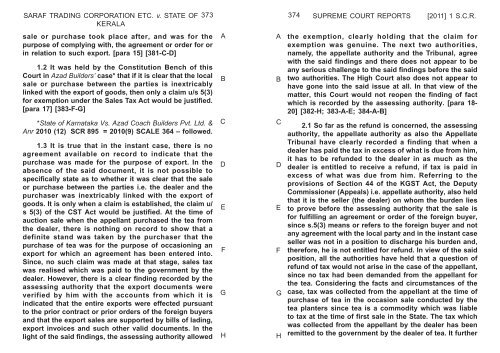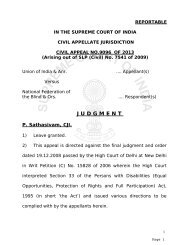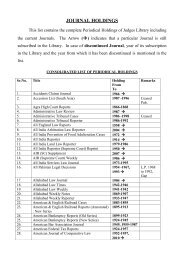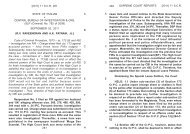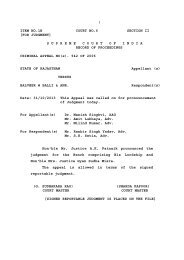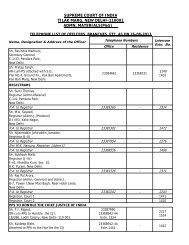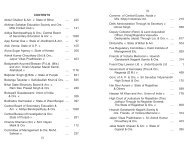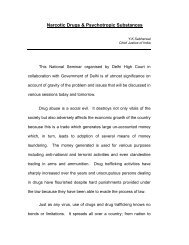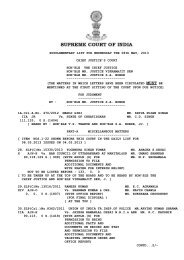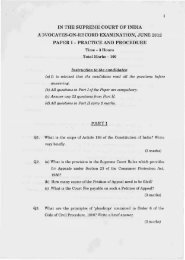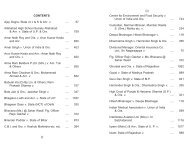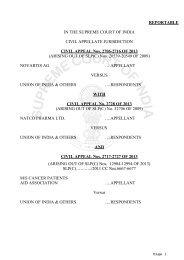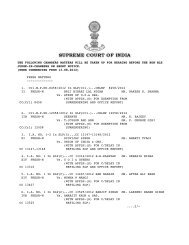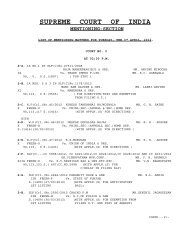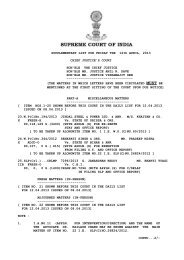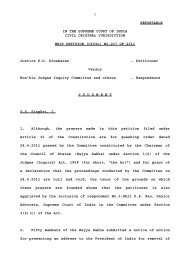Part No.II - Supreme Court of India
Part No.II - Supreme Court of India
Part No.II - Supreme Court of India
Create successful ePaper yourself
Turn your PDF publications into a flip-book with our unique Google optimized e-Paper software.
SARAF TRADING CORPORATION ETC. v. STATE OF<br />
KERALA<br />
sale or purchase took place after, and was for the<br />
purpose <strong>of</strong> complying with, the agreement or order for or<br />
in relation to such export. [para 15] [381-C-D]<br />
1.2 It was held by the Constitution Bench <strong>of</strong> this<br />
<strong>Court</strong> in Azad Builders’ case* that if it is clear that the local<br />
sale or purchase between the parties is inextricably<br />
linked with the export <strong>of</strong> goods, then only a claim u/s 5(3)<br />
for exemption under the Sales Tax Act would be justified.<br />
[para 17] [383-F-G]<br />
*State <strong>of</strong> Karnataka Vs. Azad Coach Builders Pvt. Ltd. &<br />
Anr 2010 (12) SCR 895 = 2010(9) SCALE 364 – followed.<br />
1.3 It is true that in the instant case, there is no<br />
agreement available on record to indicate that the<br />
purchase was made for the purpose <strong>of</strong> export. In the<br />
absence <strong>of</strong> the said document, it is not possible to<br />
specifically state as to whether it was clear that the sale<br />
or purchase between the parties i.e. the dealer and the<br />
purchaser was inextricably linked with the export <strong>of</strong><br />
goods. It is only when a claim is established, the claim u/<br />
s 5(3) <strong>of</strong> the CST Act would be justified. At the time <strong>of</strong><br />
auction sale when the appellant purchased the tea from<br />
the dealer, there is nothing on record to show that a<br />
definite stand was taken by the purchaser that the<br />
purchase <strong>of</strong> tea was for the purpose <strong>of</strong> occasioning an<br />
export for which an agreement has been entered into.<br />
Since, no such claim was made at that stage, sales tax<br />
was realised which was paid to the government by the<br />
dealer. However, there is a clear finding recorded by the<br />
assessing authority that the export documents were<br />
verified by him with the accounts from which it is<br />
indicated that the entire exports were effected pursuant<br />
to the prior contract or prior orders <strong>of</strong> the foreign buyers<br />
and that the export sales are supported by bills <strong>of</strong> lading,<br />
export invoices and such other valid documents. In the<br />
light <strong>of</strong> the said findings, the assessing authority allowed<br />
373 374<br />
A<br />
B<br />
C<br />
D<br />
E<br />
F<br />
G<br />
H<br />
A<br />
B<br />
C<br />
D<br />
E<br />
F<br />
G<br />
H<br />
SUPREME COURT REPORTS [2011] 1 S.C.R.<br />
the exemption, clearly holding that the claim for<br />
exemption was genuine. The next two authorities,<br />
namely, the appellate authority and the Tribunal, agree<br />
with the said findings and there does not appear to be<br />
any serious challenge to the said findings before the said<br />
two authorities. The High <strong>Court</strong> also does not appear to<br />
have gone into the said issue at all. In that view <strong>of</strong> the<br />
matter, this <strong>Court</strong> would not reopen the finding <strong>of</strong> fact<br />
which is recorded by the assessing authority. [para 18-<br />
20] [382-H; 383-A-E; 384-A-B]<br />
2.1 So far as the refund is concerned, the assessing<br />
authority, the appellate authority as also the Appellate<br />
Tribunal have clearly recorded a finding that when a<br />
dealer has paid the tax in excess <strong>of</strong> what is due from him,<br />
it has to be refunded to the dealer in as much as the<br />
dealer is entitled to receive a refund, if tax is paid in<br />
excess <strong>of</strong> what was due from him. Referring to the<br />
provisions <strong>of</strong> Section 44 <strong>of</strong> the KGST Act, the Deputy<br />
Commissioner (Appeals) i.e. appellate authority, also held<br />
that it is the seller (the dealer) on whom the burden lies<br />
to prove before the assessing authority that the sale is<br />
for fulfilling an agreement or order <strong>of</strong> the foreign buyer,<br />
since s.5(3) means or refers to the foreign buyer and not<br />
any agreement with the local party and in the instant case<br />
seller was not in a position to discharge his burden and,<br />
therefore, he is not entitled for refund. In view <strong>of</strong> the said<br />
position, all the authorities have held that a question <strong>of</strong><br />
refund <strong>of</strong> tax would not arise in the case <strong>of</strong> the appellant,<br />
since no tax had been demanded from the appellant for<br />
the tea. Considering the facts and circumstances <strong>of</strong> the<br />
case, tax was collected from the appellant at the time <strong>of</strong><br />
purchase <strong>of</strong> tea in the occasion sale conducted by the<br />
tea planters since tea is a commodity which was liable<br />
to tax at the time <strong>of</strong> first sale in the State. The tax which<br />
was collected from the appellant by the dealer has been<br />
remitted to the government by the dealer <strong>of</strong> tea. It further


